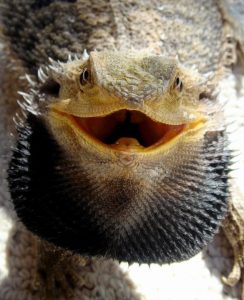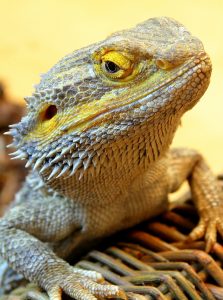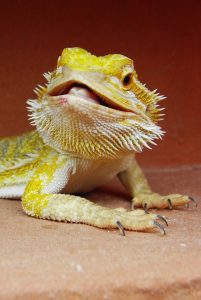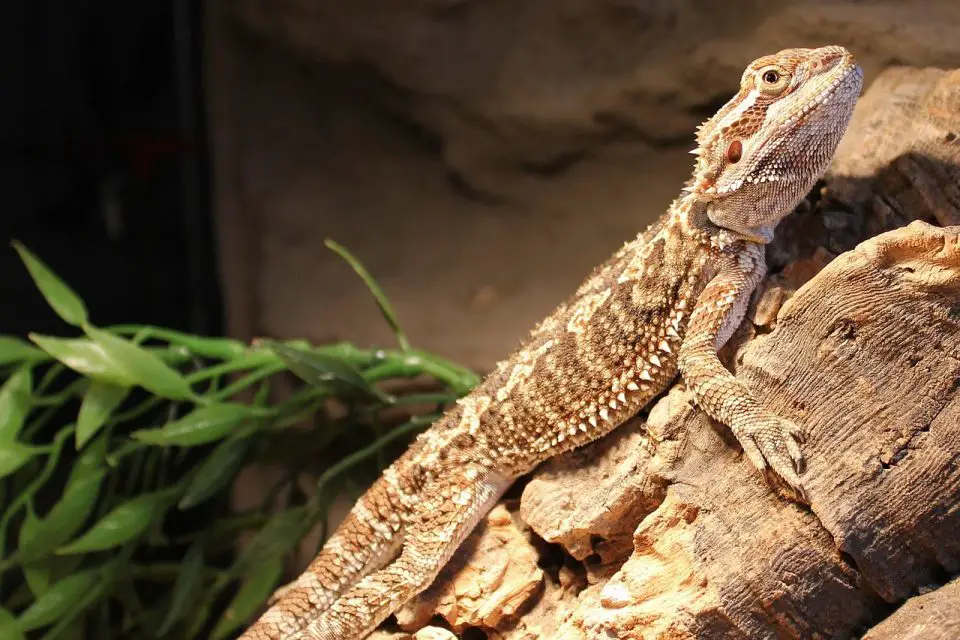When you first get your bearded dragon, you may have a lot of questions on how to tell if they are healthy and if their diet is correct – especially if you are a first time owner.
One of the most surprising places to find these answers, however, is in your bearded dragon’s poop!
Your bearded dragon’s excrement can tell you a lot about their overall health and wellbeing.
From strange colors and textures to constipation to diarrhea, a quick observation of your bearded dragon’s feces will tell you everything you need to know about their diet and health.
However, when you first see that little pile in your bearded dragon’s enclosure, you may not know what exactly you’re looking for in determining whether or not your bearded dragon is healthy.
So, to help you out, here is your complete guide to bearded dragon poop – from what’s normal to what’s not and everything in between.
What Factors Determine how Often Your Bearded Dragon Should Poop?
Before learning exactly what your bearded dragon’s poop means, you should know what exactly plays a role in what comes out.
Age
Age has a surprisingly large impact on how often your bearded dragon uses the bathroom. Think about how much is different between a baby bearded dragon and an adult.
They have different behaviors, anatomy, and even diets, so it’s no surprise that there will be differences in how often each one uses the bathroom as well.
What is normal for babies, juveniles, and adults will be discussed further below so you know exactly when a home remedy or trip to the vet is necessary.
Diet
Think about people. What you eat definitely has an effect of how often you have to use the restroom.
Cheap food or food that lacks much nutritional value will make it so that you have to use the restroom much more often than healthier food. The same thing goes for your bearded dragon.
What he or she eats each and every day will have a big impact on how often they need to defecate – as well as the quality of his or her excrement.
Lighting
It’s actually a bit more specific than lighting. Your bearded dragon’s digestion and rate of poop will actually depend more on the amount of UVA and UVB they receive every day.
UVB is a special spectrum of ultraviolet light found most abundantly in sunlight.
When your bearded dragon is in the sun and absorbs UVB, it triggers the cells in their body to produce Vitamin D, which is essential to their survival.
Vitamin D aids in digestion, especially the absorption of calcium from food. This then aids in bone development and maintenance as well as waste removal from the body.
How Often Should an Adult Bearded Dragon Poop?
 It might just surprise you how little adult bearded dragons poop. In fact, if you haven’t raised one before, you may begin to worry about your bearded dragon!
It might just surprise you how little adult bearded dragons poop. In fact, if you haven’t raised one before, you may begin to worry about your bearded dragon!
You see, for a healthy adult bearded dragon with a proper diet, lighting, and little to no stress, you’ll find that they only use the restroom an average of once every four days.
However, it is also not uncommon for your bearded dragon not to use the bathroom for up to seven days!
They also tend to poop more often in their baths than just around their enclosure, so if you’re worried about your bearded dragon’s bowel routines, make sure to check their baths if you don’t see any evidence around their enclosure.
How Often Should a Baby Bearded Dragon Poop?
Just like with human babies, baby bearded dragons poop a lot.
In fact, it’s not uncommon for your baby bearded dragon to use the bathroom up to four times a day.
Compared to adult bearded dragons who may only go once every four days, this is a big difference.
However, it’s completely normal and nothing to be concerned about.
How Often Should a Juvenile Bearded Dragon Poop?
It’s a bit tricky to give this age group an exact timeline compared to adults and babies. Juvenile bearded dragons are really in a limbo.
Some factors in their lives are experiencing more drastic changes than others.
The best way to look at your juvenile bearded dragon and determine how often they should be going to the bathroom is by deciding whether or not they are closer in age to an adult or a baby.
If your bearded dragon is nearly fully grown, then you can expect that they will begin to use the bathroom much less often, more along the lines of once every 1-4 days.
However, if they are still closer to the age of a baby, while they may not be using the bathroom three or four times a day anymore, you may still expect defecation every day or so.
Poop Problems – What if Your Bearded Dragon is Pooping Too Much?
If your bearded dragon is suffering from diarrhea, you won’t miss it. In fact, the foul, sickly smell will most likely fill up your entire house.
There are many reasons that your bearded dragon could be suddenly suffering from excessive defecation, but it is rarely a cause for concern.
Most of the time, a few dietary changes are all you need to make in order to see an improvement in your bearded dragon’s health.
Listed below are two of the most common causes of diarrhea in bearded dragons as well as how to fix them.
There are Too Many Watery Greens in Your Bearded Dragon’s Diet
Sadly, there is such a thing as too much of a good thing. You see, fruits and vegetables are an important part of every bearded dragons diet.
In fact, by the time that your bearded dragon is an adult one of their main food sources should be a salad bowl that’s always available while insects should only make up a small portion of their diet each week.
It’s important to start introducing greens young or else you’ll raise a picky eater.
However, while greens are important if you notice that your bearded dragon is regularly suffering from diarrhea you may want to take a look at just what you’re feeding them.
Certain leafy greens, especially those that are more water-based such as lettuce, can cause intestinal distress in your bearded dragon if consumed too often.
However, this distress is not something that you will need to contact your vet about for the most part.
If you suspect that this is the issue with your bearded dragon, try swapping out lettuce or other watery and leafy vegetables in their diet for other fruits and vegetables that your bearded dragon enjoys.
Your Bearded Dragon’s Food is Poor Quality or Spoiled
 Remember earlier how we were talking about how poor quality, cheap food can give you an upset tummy? Yeah, the same thing can happen to your bearded dragon.
Remember earlier how we were talking about how poor quality, cheap food can give you an upset tummy? Yeah, the same thing can happen to your bearded dragon.
They need a certain level of nutrients each and every meal to help them maintain a nice balance in their body.
If this balance is thrown out of order, you may notice that they will begin to have diarrhea more often.
Or, if their food is spoiled, there could be a bacterial infection that is making your bearded dragon sick. The latter is a much more serious issue.
For the first problem, try transitioning to a different type of food and, after a few days, see if the bowel issues improve.
For the second, switch their food immediately if you notice that it is spoiled.
If other signs of distress or illness accompany your bearded dragon’s diarrhea, consider talking to your vet about a possible diagnosis and treatments.
Poop Problems – What if Your Bearded Dragon is Pooping Too Little?
If you notice that your bearded dragon isn’t using the bathroom as much as they should, it can be initially concerning.
After all, especially with baby bearded dragons who have a higher chance of suffering from gut impaction due to accidentally swallowing their flooring, you have a lot of things that could possibly be wrong.
Thankfully, it’s rarely often that constipation in your bearded dragon is a problem that involves medical attention.
To help you decide whether or not your bearded dragon’s lack of poop is an issue, here are some of the most common reasons why your bearded dragon isn’t pooping enough – along with some possible solutions.
Your Bearded Dragon is not Eating Enough
If your bearded dragon isn’t eating enough to poop, then they won’t poop.
Try offering them a variety of different foods and make sure that it is not a greater medical concern such as an undiagnosed illness.
Your Bearded Dragon is Dehydrated
Dehydration is one of the more common causes of constipation in your bearded dragon.
A bearded dragon that is dehydrated we’ll have sunken eyes and appear lethargic.
Make sure that your bearded dragon always has fresh clean water available in their enclosure.
Your Bearded Dragon is not Getting Enough Exercise
Believe it or not your bearded dragon actually needs a lot of exercise each and every day, and a bearded dragon that is not getting this exercise may experience constipation as well as other bowel problems.
To encourage activity in your bearded dragon try investing in some special toys to entertain him or her
The Temperature in the Enclosure is Wrong
Bearded dragons, like all reptiles, need a very certain temperature gradient in their enclosure to live a healthy, happy life.
If the temperature is too low in your bearded dragons enclosure they may become lethargic and not eat, or if they are eating they may be lacking the heat to help them digest their food.
On the other hand if the temperature in the enclosure is too high, your bearded dragon will become stressed and focus more on trying to escape the uncomfortable area rather than eating.
As mentioned above if your bearded dragon is not eating they cannot use the restroom.
To fix this problem, make sure to keep a close eye on both temperature and humidity in your bearded dragon’s enclosure.
Your Bearded Dragon is Suffering From gut Impaction
While this is one of the rarer issues, it is the most serious, and, if it is not treated properly, it can lead to death.
Bearded dragons, especially younger ones that are not adept hunters yet, may accidentally swallow some of the substrate that lines the bottom of their enclosure.
This tends to happen more often if the substrate is sand. When swallowed, the substrate cannot be digested, and, after a while, it will form a blockage in your bearded dragon’s intestines.
This is an extremely serious medical condition, so if you suspect that this is why your bearded dragon is not using the restroom as often, then you need to speak to your vet as soon as possible.
Final Thoughts: How Often Do Bearded Dragons Poop
 As you can see, poo can be a vital indicator of how happy and heathy your bearded dragon is.
As you can see, poo can be a vital indicator of how happy and heathy your bearded dragon is.
Although unplesant, getting a good look at the gifts your little beastie has left behind can give you vital clues into their wellbeing. This could be a nice simpe fix or more serious medical conditions.
Of course, like people not every bearded dragons bathroom routine will be the same. You need to get well acquainted with your bearded dragon and their rear end. It could help save your little beasties life.
I hope this little guide has opened your eyes to the wonderful world of poop!
